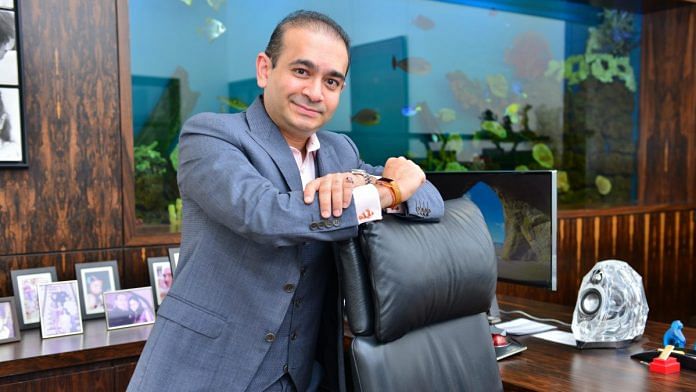New Delhi: Fugitive diamond merchant Nirav Modi, one of the accused in the Rs 11,000-crore Punjab National Bank (PNB) fraud case, Thursday lost a bid to move the UK Supreme Court against his extradition to India, technically exhausting all his legal remedies to stay in Britain.
However, he still has a political asylum request pending with the UK authorities, which is his last hope to evade extradition.
In case he is granted asylum, he would not be extradited to India despite court orders. Modi had moved the request in 2018, when he had fled from India.
“As far as the extradition request from India is concerned, in connection with Nirav Modi’s involvement in the multi-crore fraud, he has exhausted all his legal remedies to stay back in the UK. This is a big victory for us and he should be sent back to India for a further probe after this,” a government source said.
“He, however, still has a request for political asylum pending with the UK authorities, which is a separate procedure. That is his last-ditch attempt to evade extradition,” the source added.
The High Court in London on 9 November had given the go-ahead for Modi’s extradition to India.
Modi had appealed against the extradition saying he had “suicidal tendencies”. The High Court, however, rejected the plea after an assurance from the Indian government that a panel of experts and doctors would take care of Modi’s mental condition and risk of suicide.
Modi’s counsel had also raised concerns over the “poor condition of the prison” (Mumbai’s Arthur Road Jail), which would apparently put him at high risk of committing suicide.
Also read: Nirav Modi to be kept in custody till 29 March after UK court denies him bail
A long process
Extradition is a long-drawn judicial process that can be reviewed multiple times. For countries that have a treaty with the UK, extradition requests require decisions by both the home secretary and the courts.
Once a request is made, the home secretary has to certify the request, and then the hearing in the case begins. For a judge to pass an order in favour of the country demanding extradition, they have to be satisfied that the person will get a fair trial in the requesting country and that their human rights will not be violated after being extradited.
If the judge is satisfied that the person can be extradited, the case is once again sent back to the home secretary for a decision on whether to order extradition. The person can challenge this in the higher courts.
Similarly, the decision of the High Court can be challenged in the Supreme Court, but only with the permission of the High Court — which was denied in Modi’s case.
What is the PNB fraud?
The fraud was detected at PNB’s Brady House branch in Mumbai after it was found that some letters of undertaking (LoUs) and foreign letters of credit (FLCs) were fraudulently issued to some overseas branches of Indian banks by misusing SWIFT, a messaging network that banks use to securely transmit information and instructions through a system of codes.
It was during the scrutiny of SWIFT records that the scam came to the fore.
PNB, in its complaint to the Central Bureau of Investigation (CBI), directly accused Modi, his wife Ami, brother Nishal, and businessman uncle Mehul Choksi of conniving with two bank officials to commit the fraud.
According to the investigators, 293 LoUs were issued to Modi and his companies in 2017 and 2018.
An LoU is a guarantee given by a bank branch in India to an overseas bank that it will meet the liability if the borrower defaults.
During investigation, several raids were carried out in the case. The Enforcement Directorate has, until now, searched more than 251 properties across India.
It has also seized diamonds, jewellery, precious and semi-precious stones, and gold worth crores, along with immovable properties belonging to Modi and Choksi worth Rs 8,000 crore.
(Edited by Nida Fatima Siddiqui)
Also read: Nirav Modi’s art collection is worth Rs 57 cr, includes Raja Ravi Varma & Amrita Sher-Gil



